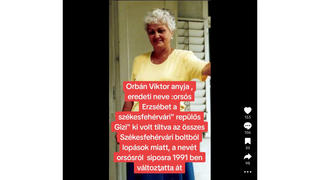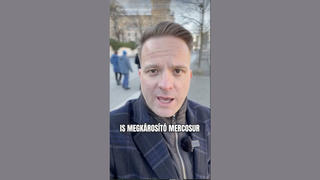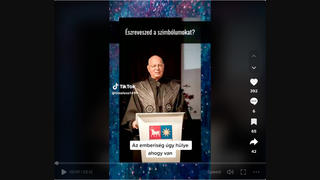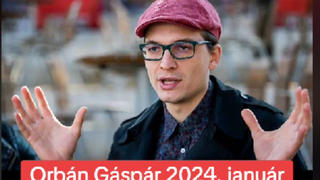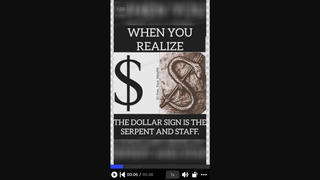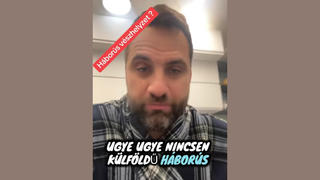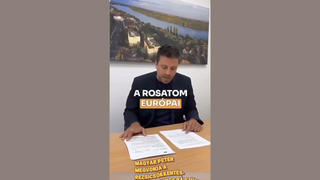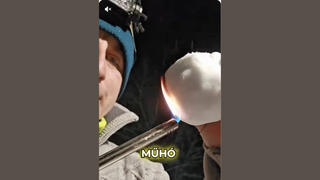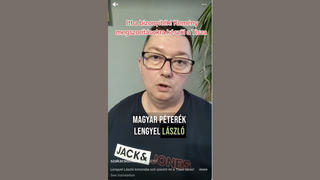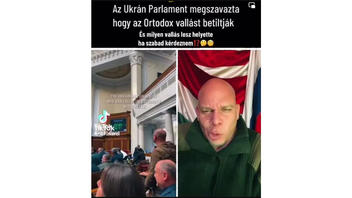
Did Ukraine outlaw the practice of Orthodox Christianity? No, that's not true: Ukraine's parliament gave preliminary approval to a law that would prohibit the activities of religious organizations headquartered "in a state that carries out armed aggression against Ukraine." Observers say the measure will effectively ban the Ukrainian Orthodox Church, a Moscow-linked confession that is accused of collaborating with Russia in its 2022 invasion. It does not affect Ukraine's autocephalous Orthodox church, which claims a majority of believers in the country.
The claim appeared in a Hungarian-language video (archived here) on TikTok on October 30, 3023, under the caption "The Ukrainian Parliament voted to ban the Orthodox religion -- And which religion will replace it, if I may ask ⁉️🤔🧐" It shows footage of Ukrainian deputies approving the bill, and the speaker says:
What? Do I see what I see? ...The Ukrainian parliament voted to ban the Orthodox Christian religion in the country? What's going on? Who exactly is running the Ukrainian parliament? ...The oldest Orthodox church can be found on Ukrainian territory. From 1051, if I am correct? ...This is going to be a problem.
(All translations from Hungarian to English by Lead Stories staff.)
This is what the post looked like on TikTok at the time of writing:
(Source: TikTok screenshot taken on Fri Nov 3 09:42:28 2023 UTC)
On October 19, 2023, Ukraine's parliament approved a bill titled "Amendments to the Laws of Ukraine Regarding the Activities of Religious Organizations in Ukraine," which would add the following language to the 1991 Law on the Freedom of Conscience and Religious Organizations:
Activities of religious organizations that are affiliated with the centers of influence of a religious organization (association), the governing center (control) of which is located outside of Ukraine in a state that carries out armed aggression against Ukraine, are not allowed. (All translations from Ukrainian to English by Google Translate.)
The bill's authorizing legislation stipulates that it will not become law until it has passed a second reading in parliament, which had not occurred at the time of writing.
On October 6, 2023, Ukrainian lawmaker Oleg Dunda informed news outlet Kyiv24 that the measure is directed at the Ukrainian Orthodox Church-Moscow Patriarchate (UOC-MP). Clerics from this denomination have been accused of supporting Russian invasion forces. He said:
There is already a relevant inquiry concerning the fact that the UOC-MP is a church subordinated to Moscow, with its center located in Moscow. Accordingly, once the law is signed by the president, the legalization of this inquiry and the prohibition of the UOC-MP...will be launched by all means.
Polling data indicates that UOC-MP ministers to a small minority of Ukraine's faithful. In a March 2022 survey conducted by the Info Sapiens agency, only 4 percent of respondents expressed loyalty to the Moscow Patriarchate, while 52 percent identified with the Orthodox Church of Ukraine, an ecclesiastically independent branch of Orthodoxy that formally separated from the Russian Orthodox Church in 2019, according to Encyclopedia Britannica. The remaining respondents indicated adherence to other Christian denominations, Islam, or reported having no religious affiliation.
There is also no evidence that the prospective law will cause a "problem" in Ukraine, as the TikTok video suggests. A December 2022 poll by the Kyiv International Institute of Sociology found that:
78% of Ukrainians believe that the state should intervene in the activities of the UOC (MP) to one degree or another. In particular, 54% of them believe that this Church should be completely banned in Ukraine. Another 24% are in favor of a somewhat "softer" approach, which does not involve a complete ban, but involves the establishment of state control and supervision. Only 12% of respondents believe that nothing should be done.
Patriarch Bartholomew of Constantinople, the top official in the Orthodox hierarchy, supports the primacy of the Orthodox Church of Ukraine against its Moscow-backed rivals. In a letter published by the Religious Information Service of Ukraine on October 6, 2020, Bartholomew stated that since 2019:
The new autocephalous Church of Ukraine is the only canonical Orthodox Church on the territory of the Ukrainian State and His Beatitude Metropolitan Epiphanios of Kyiv and all of Ukraine ought to be recognized as its canonical Primate. In accordance with the canonical principle of territoriality, which is inherent in and a permanent given of Orthodox ecclesiology, no other Church can be present within the jurisdiction of the Church of Ukraine.
The UOC-MP said it had cut ties with the Moscow Patriarchate in May 2022. However, Ukrainian authorities continued to raid its parishes and arrest its priests, including one who is accused of blessing the Russian tanks that hammered the city of Bucha in March 2022, according to Politico.



